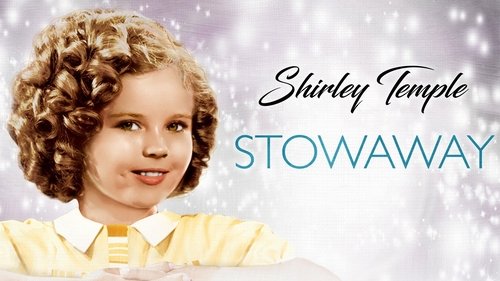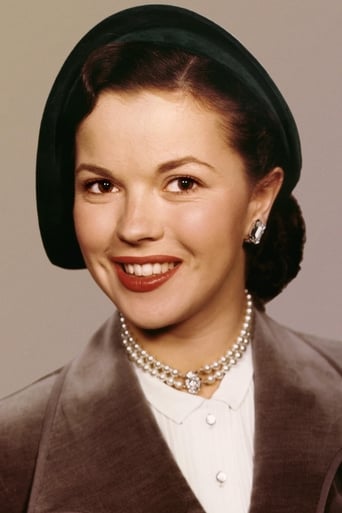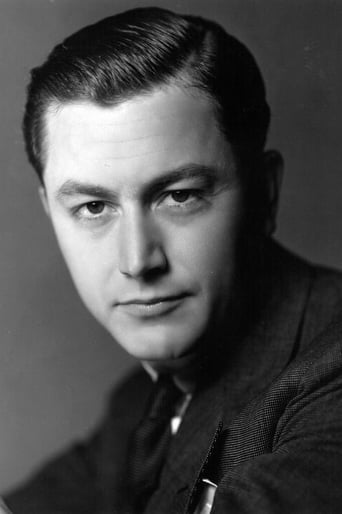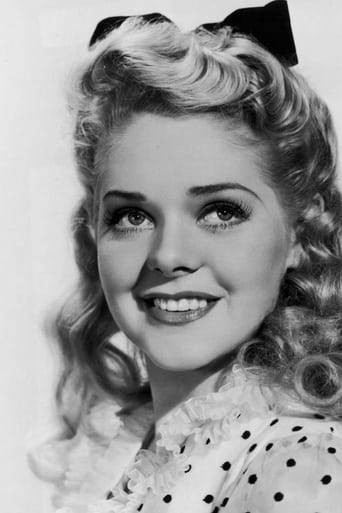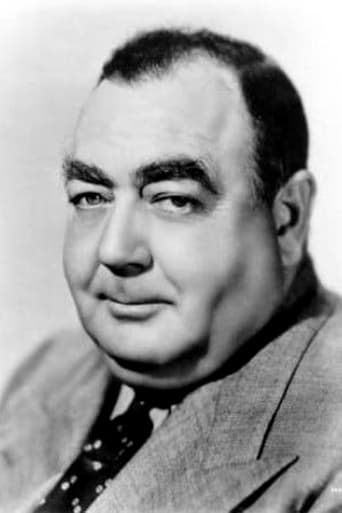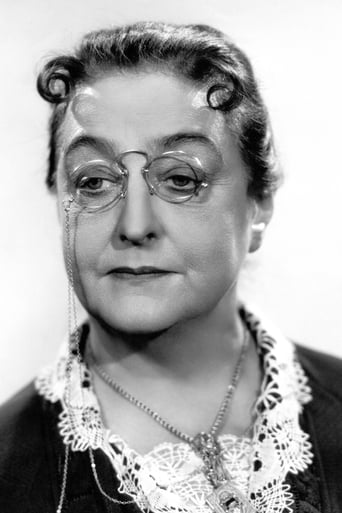weezeralfalfa
In a recent tribute to Shirley Temple by TCM, upon her recent death, this was my favorite of 4 pre-'39 films, including "Heidi". It was also the only one of the 4 I didn't remember seeing in the distant past. I enjoyed it more than the others for several reasons. It has the zaniest story, which some reviewers consider a negative, but I find amusing. Shirley is mostly called by her pet Chinese name Ching-Ching, this story supposedly taking place in several parts of China, or on a ship. Unlike many of her films, there is no real sourpuss(adult or child) that Shirley has to deal with much of the time. The cute and charismatic Alice Faye is often present(as Susan). She gets to sing a couple of Revel-Gordon songs without Shirley.. Then, Shirley is at her most charismatic age as a child star, in my opinion. Non-musical, but personable, Robert Young was borrowed from MGM to serve as the male lead: notorious playboy Tommy Randall. He and Shirley seemed to get along great, the scripted Shirley having a closer relationship with him than with Alice(true in most S.T. films I've seen) Although rotund Eugene Palette is billed high on the player's list, in fact, he had only a small, inconsequential, role. Helen Westley, as the mother of Young's rival(Richard) for the affections of Alice, plays her usual domineering matron role. Arthur Treacher is present at times, in his usual stiff British valet role.The story begins in the apparently mythical Chinese city of Sanchow, situated upstream from Soochow, on the Yangtze. Shirley's foster parent, a missionary, declares that he and Shirley will remain in Sanchow, despite the report that a large bandit army is about to descend on the city. However, Shirley's Chinese friend, sun lo, arranged for a friend, Chang, to take her by sampan, down the Yangtze, to stay with his brother in Shanghai. But upon arrival, Chang steals Shirley's purse so he can participate in a gambling game, and disappears. So, with her Pekinese: Mr. Woo, she wanders around the wharf area, until she spies Young, trying to communicate with a shopkeeper about a purchase, Shirley translates his want and saves him some money. So, they become acquainted, and Shirley gets a ride in his open car, he stopping to visit a friend. While she waits in the car, a shower passes, causing her to transfer to the trunk, which she closes and falls asleep. Soon, the car is loaded onto a ship for Hong Kong and beyond. Thus, she is an accidental stowaway, eventually hiding in the room occupied by Alice and her mother-in-law-to-be. This eventually leads to the meeting of Alice and 'Uncle Tommy'(Young), relating to Shirley. Despite Alice being engaged to another man(Richard Hope),she responds somewhat to Young's romantic overtures, and they dance lightly while she sings the love song "Goodnight My Love", previously sung by Shirley as she is drifting off to sleep.. Richard boards the ship at Hong Kong, and friction between the two men begins when Hope discovers the dalliance with his fiancé, which the duo ascribe to their common interest in the welfare of Shirley.Later, Alice decides to cancel her planned wedding when she discovers what a mama's boy her fiancé is, and that mama plans to live with them. Meanwhile, Young gets news that Shirley's missionary father was killed in the bandit raid. He wants to adopt Shirley to prevent her being sent to a Shanghai orphanage. But, as a bachelor, Young can't legally qualify. Thus, he finally arm-twists Alice into marrying him, so they can adopt Shirley, with the understanding that Alice can then go to Reno for a divorce, if she doesn't want to stay married to the wealthy, but playboy, Young character. Shirley is very happy at this news, as Young and Alice seem like her fantasy new parents.Well, Alice decides to go through with the divorce in Reno, with her old boyfriend, Hope, waiting in the wings, promising to dump his mother, if Alice will take him back. But the judge(played by Edward Bromberg), after taking a look at the duo of Young and Shirley, decides to have a private talk with Shirley, who obviously tells him she doesn't want her new parents to split. The judge has Shirley take the stand, after coaching her what to say in response to his questions. However, at one point, she says 'holy macaroni' for 'holy matrimony', thus clearly exposing her act. Nonetheless, the judge rules against the grounds for divorce, and the threesome have a happy Christmas, with Shirley singing "That's What I Want for Christmas": quite a catchy tune, with its depression-era appropriate lyrics, not always clearly enunciated by Shirley. The gifted lyricist Irving Caesar Irving did the lyrics to this, as well as Shirley's signature song "Animal Crackers in My Soup" While the ship is docked in Hong Kong, Shirley has a stage performance, in which the audience members are invited to go on stage and give a performance. She follows oriental Sammee Tong's imitation of Bing Crosby's singing style, with "You Gotta S-M-I-L-E to be H-A-double P-Y". She does stage impressions of Al Jolson and Eddie Cantor, then danced with a dummy, supposedly representing Fred Astaire.
Snow4849
"Sparkle, Shirley, sparkle!" Gertrude Temple cried between takes whenever her little daughter's energy flailed. As Ching-Ching, an American girl living in China, Shirley sparkles, all right; she just never dazzles. Little Ching-Ching is full of happy grins and spouts plenty of wise Chinese proverbs, but not once does she break into one of the delightful song-and-dance routines that make Shirley's other films so memorable. She only dances very briefly in this movie, and it is a great disappointment to fans who want to see the tapping that made her such a world famous star.Another disappointment is the absence of memorable music. Shirley's song "You've Gotta Smile to be Happy" showcases her impressive talent for mimickry -- she channels Eddie Cantor and Ginger Rogers, among others -- but her other two songs, "Goodnight My Love" and "That's What I Want for Christmas," completely lack the snap and fun of catchy classics like "On the Good Ship Lollipop" (Bright Eyes), "Animal Crackers in My Soup" (Curly Top), "At the Codfish Ball" (Captain January), "Oh My Goodness" (Poor Little Rich Girl), or "The Old Kent Road" (The Little Princess).What sparkle Shirley does achieve is snuffed by the dreary adult performances. Ching-Ching's rural guardians, the Kruikshanks, and her pal Sun Lo are almost laughable. Alice Faye's character, Susan Parker, is clearly in love with Ching-Ching, but that's about the only emotion she seems to have. Susan has been harboring doubts about her engagement to the very contrived, cardboard character Richard Hope -- largely because of Richard's sickly enmeshment with his mother, played to meddlesome perfection by Helen Westley -- when she begins to feel a budding romance for Ching-Ching's rich, handsome guardian, Thomas Randall. Her choice between the two men is supposed to seem dramatic and difficult, but instead Susan only comes off as indecisive and wishy-washy. In another Shirley film, "Poor Little Rich Girl," Alice Faye displays a natural chemistry with her on screen husband Jack Haley, but in "Stowaway," Susan's relationships with both are Richard and Thomas are severely lacking, and together these three adults manage to display all the passion of a dentist office. Arthur Treacher does add some charming and unexpected wit in his small role as Thomas's butler, but if you want to see the full extent of Temple and Treacher's talents, watch them together in "The Little Princess," but not "Stowaway."
